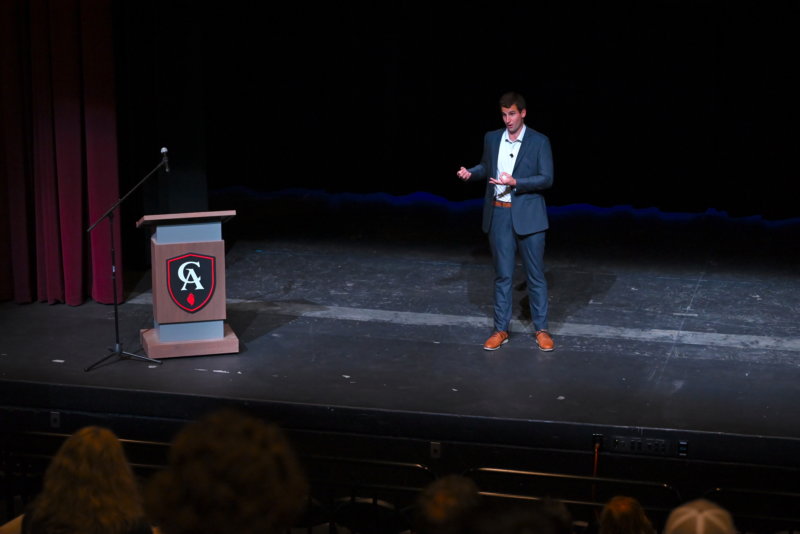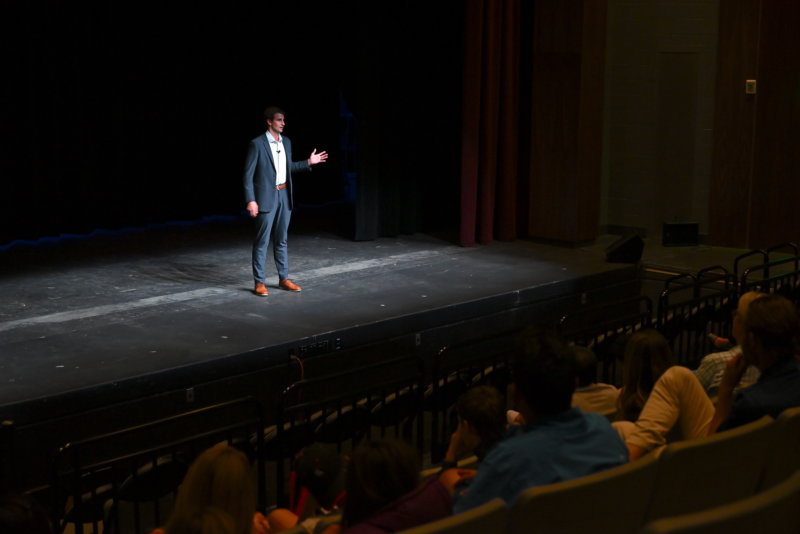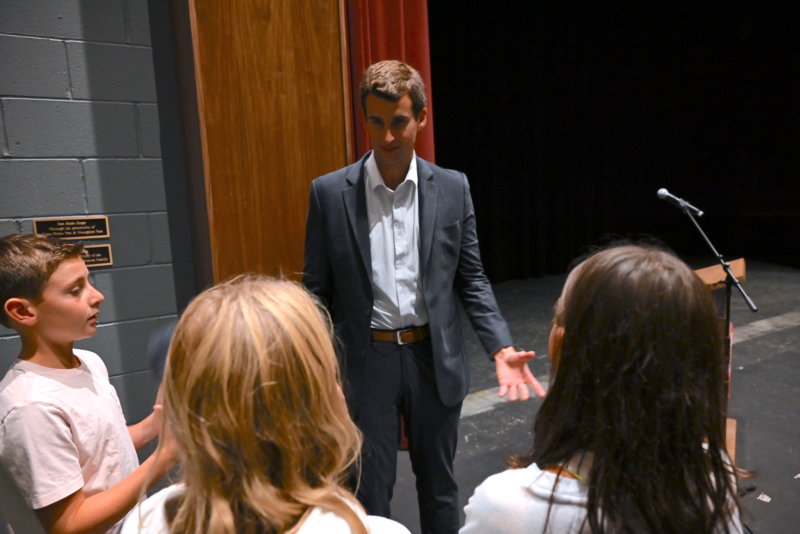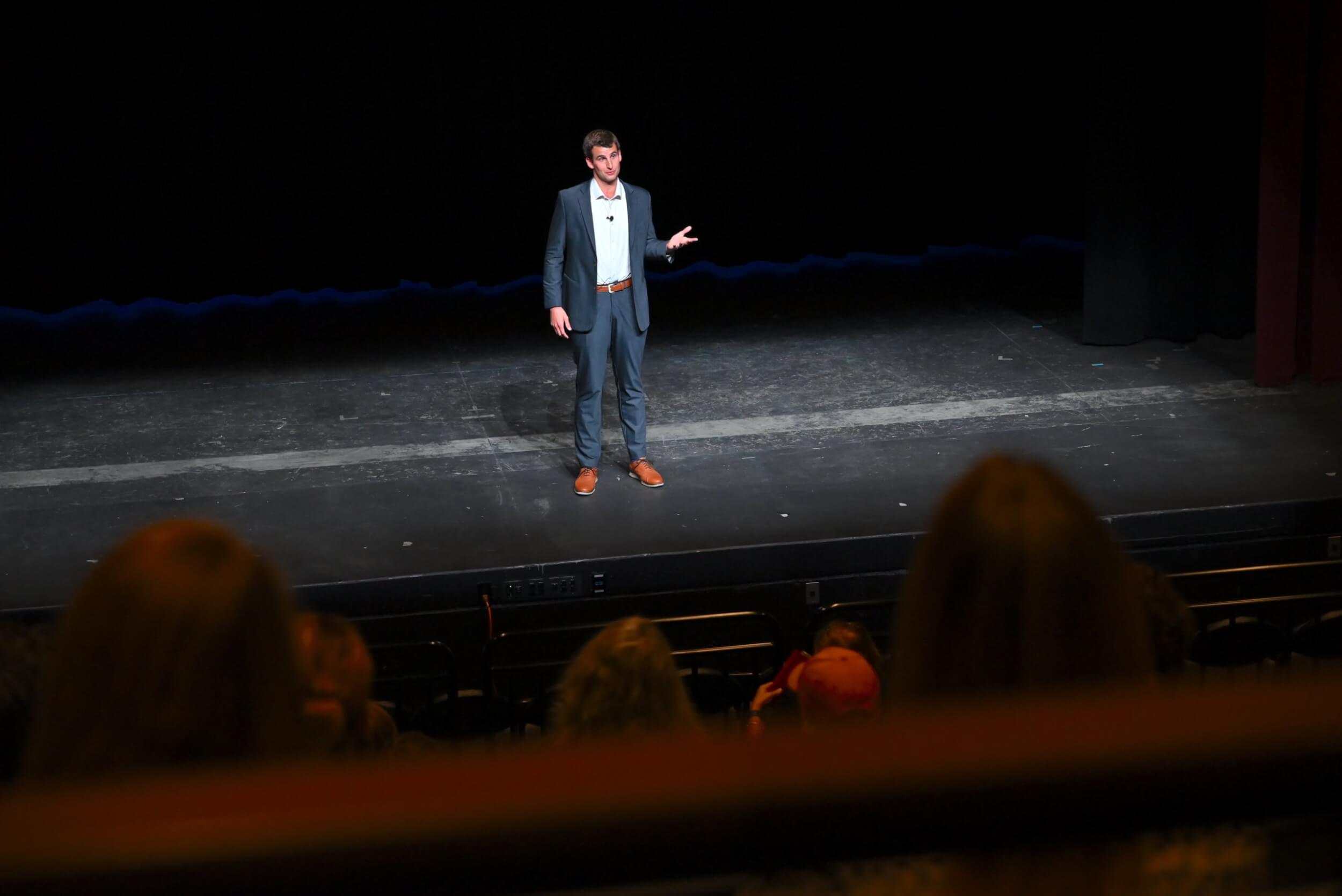Sharing his near-miraculous life story with Colorado Academy families and other guests at the first SPEAK (Series for Parent Education About Kids) event of the 2022-2023 school year, Austin Hatch brought a spirit of hope to the Leach Center for the Performing Arts on September 14, 2022.

Presented by CA’s REDI Lab Aimee and Jonathan Coleman Center, the event—titled “Overcoming Adversity using G.R.I.T.”—highlighted an approach to surmounting obstacles he developed after suffering, and recovering from, two family tragedies.
When Hatch was eight years old, a plane crash claimed the lives of his mother, sister, and brother, leaving his father severely injured after he heroically saved Hatch’s life. The young boy’s own injuries were minor, but, he recalled, the pain of losing his mother and siblings left a permanent scar.
Hatch and his father eventually were able to move on from the tragedy, finding solace in their bond and, later, in the new family they were able to build with his father’s second wife and her three children.

Life seemed almost normal for a time, and Hatch thrived. Working hard on his basketball skills throughout high school, he was offered a full scholarship to play for the University of Michigan.
“It was a dream come true,” said Hatch.
Then, tragedy struck again: a second plane crash claimed the lives of his father and his new mother, and put Hatch in the hospital in critical condition, with a traumatic brain injury and in a medically-induced coma. His dream of playing basketball at Michigan seemed permanently out of reach.
But with the support of family members and the mentorship of an influential coach during his final year of high school, Hatch was able to recover, eventually making it to Michigan—on the same full scholarship he had been promised before the crash. His astonishing determination and positivity in the face of incredible losses earned national attention, with Hatch the subject of an ESPN documentary that has been viewed by a quarter of a million people.
“When you are millimeters away from death, you look at life through a different lens,” he said.
The G.R.I.T. framework

After graduation, Hatch began thinking about the concept of “grit” as popularized by University of Pennsylvania professor and New York Times bestselling author Angela Duckworth. According to Duckworth, “Grit is passion and perseverance for very long-term goals. Grit is sticking with your future, day in and day out, not just for the week or month—but for years, and working really hard to make that future a reality.”
Hatch developed his own take on Duckworth’s idea—the G.R.I.T. framework, which he shares with businesses, teams, and other organizations around the country.
“Whether it is COVID-19 or something else, there will always be challenges,” he said. “That’s something that we all have in common. But I believe that anyone can thrive, no matter what the circumstances.”
After those two plane crashes, Hatch explained, his goal wasn’t just to survive. It was to thrive. And now, after years of reflection, he believes the key is G.R.I.T.
The definition of G.R.I.T.
The “G” in G.R.I.T. stands for growth mindset. “This means seeing every setback, every failure, as an opportunity,” said Hatch. If we don’t perform as well as we might desire, he explained, we must find ways to do better. “We learn a lot more in life from losing than we do from winning.”
The “R” is the decision to be resilient—or, as Hatch explained, “taking focused and massive action in the face of adversity. In other words, go big or go home.”
The next letter, “I,” means integrity. “Of course integrity means doing the right thing,” Hatch said. “But what I mean when I talk about integrity is following through on our commitments, especially when our circumstances change.” He pointed to the example of the Michigan coach who came through on the offer of the basketball scholarship, even after Hatch had suffered catastrophic injuries.
The final letter in “G.R.I.T.” represents a team-first mentality—“we before me,” as Hatch described it. This may be the most important component of the G.R.I.T. approach. “Serving a greater purpose—whether it’s a team, family, business, organization—is an essential ingredient in overcoming adversity.” Hatch cited his “family in heaven” as a greater purpose that drives him today.

After Hatch’s presentation, audience members asked for practical advice on applying his approach in their own lives.
“After the second plane crash,” he recalled, “after I came out of the coma, I was trying to do one thing each day that I couldn’t do the day before. Take small steps each day. After 100 days, you’ll be in a pretty good position.”
Anyone can be “gritty,” Hatch assured the audience. The obstacles we overcome each day determine whether or not we have grit. “Each challenge you take on prepares you for the next one; so when the ‘big one’ comes, you’ll be ready.”
